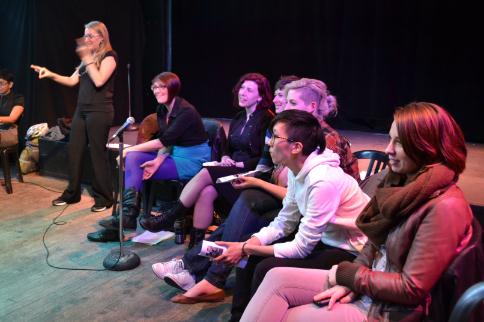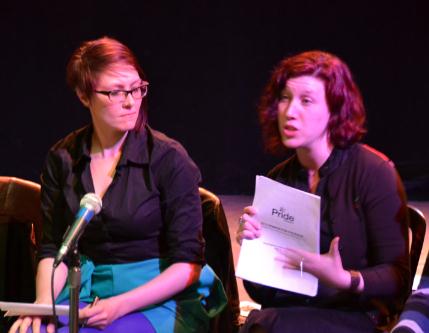
The Dyke March committee met recently at Buddies in Bad Times Theatre to discuss early plans for the 2012 march. Credit: Andrea Houston
For the first time, the Dyke March will end with a political picnic at Allan Gardens after stomping down Yonge St.
Its organizing committee recently hosted a meeting at Buddies in Bad Times Theatre to discuss plans and brainstorm ideas for the 2012 march. Many said it is important for the march to remain political and anti-corporate.
“Achieving a critical mass of women marching in the street is in itself political,” one community member said. “Just saying ‘I’m a dyke’ is political.”
When asked about the relationship between the Dyke March and Pride Toronto, committee member Laura Krahn says there have been tensions in the past, so “we stay independent.”
Like Pride Toronto, the Dyke March has had its share of upheaval. In 2010, some community members, frustrated with festival organizers, formed a break-off group dubbed “Take Back the Dyke.” Others also went on to create the Stonewall TO march last year.
“Some feel that since Pride Toronto has become too much of a party, some of the politics are lost,” organizer Anna Evans says. “The Dyke March should be more of a demonstration.”
Meg Black agrees. She hopes to see the Dyke March committee host more community meetings, information sessions and panels, leading up to the march. “Pamphlets are great, but talking is better.”
Black would like to see the Dyke March take a strong position this year against biphobia, an issue she says doesn’t get enough attention.
“Biphobia is disgusting,” she says. “The same queers that fought hard for acceptance can sometimes ridicule others, like those that call themselves ‘gold star lesbians’ because they’ve never slept with a man. It’s unfortunate, and it’s something we should strive to overcome. Bisexuals have been marching for years with dykes, and they do it invisibly.”
Krahn says she couldn’t agree more. That’s why the theme this year is “celebrate and demonstrate all types of dykes,” which broadly includes bisexuals, trans women, pansexuals, asexuals and any other queer-identified women and trans allies.
“The Dyke March is a safe and welcoming space,” she says. “Bring your issues.”
Right now, organizers need people to volunteer and get involved. Krahn says they are recruiting a “street team,” who will help with marshalling and planning for the picnic in Allan Gardens.
Speakers and performers are needed for the rally, which will be held before the march kicks off.
Lari Baycroft reminded the committee that social media doesn’t reach everyone. Many older women may not be on Twitter. She suggested going to community meetings and events to make announcements. “For the more senior members of the community, they need a personal touch to get them involved.”
A Dyke March meet-and-greet event is planned for May 15 at the 519 Church St Community Centre from 8 to 10pm. Also, there is a Town Hall for Political Queers planned for May 27 at 2pm at The 519.
Follow the Dyke March team on Twitter @DykeMarchTO and their blog here.

 Why you can trust Xtra
Why you can trust Xtra


